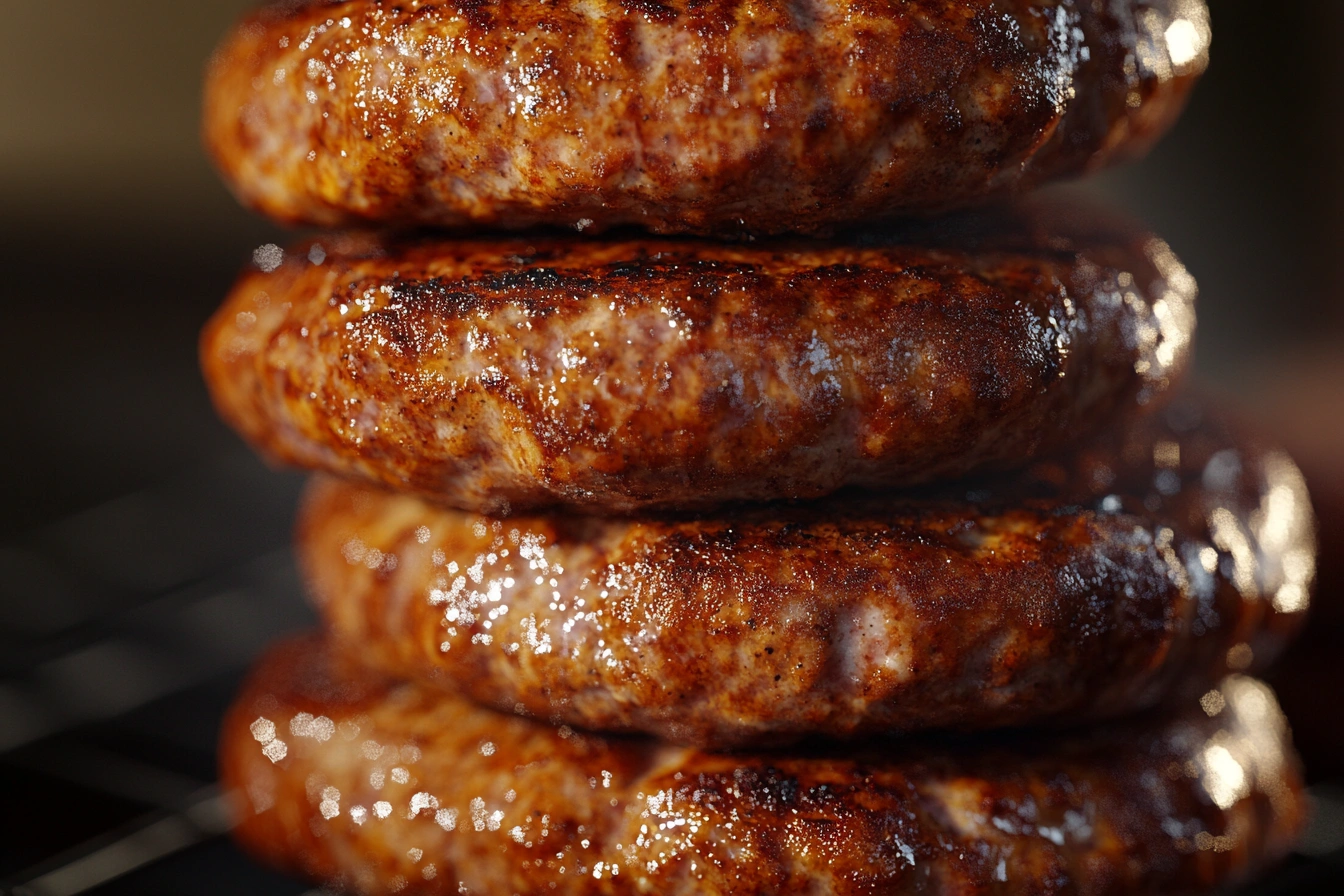Understanding Turkey Breakfast Sausage
Introduction to Turkey Breakfast Sausage
What is Turkey Breakfast Sausage?
Turkey breakfast sausage is a lean and flavorful alternative to traditional pork sausage. Made from ground turkey and a blend of classic sausage spices like sage, black pepper, garlic, and thyme, it offers a delicious and healthier option for breakfast lovers. Turkey sausage can be found in various forms, including patties, links, and crumbles, making it a versatile addition to many breakfast dishes.
Why is it Considered a Healthier Alternative to Pork Sausage?
Compared to pork sausage, turkey sausage contains significantly less saturated fat and fewer calories while still being high in protein. This makes it a better choice for those looking to maintain heart health, manage weight, or reduce their intake of processed meats with high-fat content. Additionally, turkey sausage has a leaner nutritional profile, making it an excellent option for those following low-fat, high-protein, or calorie-conscious diets.
Growing Popularity of Lean Protein Options in Diets
With increasing awareness of healthier eating habits, many people are shifting toward lean protein sources. Turkey breakfast sausage is becoming a popular staple among those following keto, paleo, and high-protein meal plans. It offers the same savory, seasoned taste as pork sausage while being lower in fat and better suited for individuals looking to maintain a balanced diet.
Table of Contents
Nutritional Breakdown of Turkey Breakfast Sausage
Calories, Protein, Fat, and Sodium Comparison with Pork Sausage
The nutritional profile of turkey breakfast sausage can vary depending on whether it is homemade or store-bought. However, a standard 2-ounce (56g) turkey sausage patty typically contains:
- Calories: 80-120 kcal
- Protein: 10-12g
- Total Fat: 4-7g
- Saturated Fat: 1-2g
- Sodium: 300-600mg (varies by brand)
In comparison, a 2-ounce pork sausage patty contains:
- Calories: 160-200 kcal
- Protein: 8-10g
- Total Fat: 12-18g
- Saturated Fat: 4-6g
- Sodium: 400-800mg
Macronutrient Analysis
Protein Content and Muscle-Building Benefits
Turkey sausage is high in protein, making it an excellent choice for individuals focused on muscle growth and recovery. Protein is essential for building lean muscle mass, and eating protein-rich foods like turkey sausage can increase satiety and reduce overall calorie intake.
Fat Content (Saturated vs. Unsaturated Fats)
Turkey sausage is significantly lower in saturated fat compared to pork sausage, which is important for heart health. A diet high in saturated fat has been linked to an increased risk of heart disease and high cholesterol. The healthier fat profile in turkey sausage makes it a better option for those looking to improve cardiovascular health.
Carbohydrates in Store-Bought Turkey Sausage
While plain turkey sausage is naturally low-carb, some store-bought varieties contain added fillers, sugars, or preservatives that increase carbohydrate content. It’s important to check ingredient labels to ensure you’re choosing a low-carb option if you’re following a keto or low-carb diet.
Micronutrient Content
Key Vitamins and Minerals Found in Turkey Sausage
Turkey sausage provides important vitamins and minerals, including:
- Vitamin B6 & B12 – Essential for energy production and brain function.
- Zinc – Supports immune function and metabolism.
- Iron – Helps transport oxygen throughout the body.
- Selenium – Acts as an antioxidant, protecting cells from damage.
How Different Ingredients Impact Nutrition
The nutritional value of turkey sausage depends on added ingredients. Store-bought options may include preservatives, artificial flavors, or excess sodium, which can affect overall health benefits. Making homemade turkey sausage allows for better control over ingredients, ensuring a healthier, cleaner version.
Health Benefits of Turkey Breakfast Sausage
Lower Fat Content: How it Supports Heart Health and Reduces Cholesterol Risk
One of the biggest advantages of turkey breakfast sausage is its low saturated fat content. Diets high in saturated fat have been linked to high cholesterol levels and an increased risk of heart disease. By choosing turkey sausage over pork, you reduce your intake of unhealthy fats, which can help:
- Maintain healthy cholesterol levels
- Lower the risk of cardiovascular diseases
- Improve overall heart function
Turkey sausage also contains unsaturated fats, which are beneficial for heart health and support proper brain function.
High Protein Benefits: Satiety, Weight Management, and Muscle Maintenance
Turkey sausage is protein-dense, making it a great choice for those looking to stay full longer and reduce cravings. High-protein foods help:
- Regulate appetite by reducing hunger hormones.
- Support muscle repair and recovery, especially after workouts.
- Improve metabolism, as the body burns more calories digesting protein compared to fats or carbohydrates.
For athletes, fitness enthusiasts, and individuals on weight-loss journeys, incorporating lean protein sources like turkey sausage can aid in muscle retention and overall body composition.
Lower Calorie Count: Ideal for Calorie-Conscious Eaters
Since turkey sausage contains fewer calories per serving compared to pork sausage, it’s an excellent option for those watching their calorie intake. Replacing high-calorie, high-fat breakfast meats with turkey sausage can help individuals:
- Lose weight while maintaining muscle mass
- Stay within their daily caloric goals without sacrificing protein intake
- Enjoy a satisfying breakfast without excess fat and calories
Comparison to Other Breakfast Meats
Turkey breakfast sausage offers a healthier alternative to many popular breakfast meats:
| Breakfast Meat | Calories (per 2 oz) | Protein | Total Fat | Saturated Fat | Sodium |
|---|---|---|---|---|---|
| Turkey Sausage | 80-120 kcal | 10-12g | 4-7g | 1-2g | 300-600mg |
| Pork Sausage | 160-200 kcal | 8-10g | 12-18g | 4-6g | 400-800mg |
| Bacon | 150-180 kcal | 6-8g | 12-16g | 5-7g | 600-900mg |
| Ham | 100-130 kcal | 8-10g | 3-5g | 1-2g | 700-1000mg |
| Plant-Based Sausage | 120-180 kcal | 10-12g | 8-12g | 1-3g | 400-700mg |

Is Turkey Breakfast Sausage Always Healthy?
While turkey breakfast sausage is often considered a healthier alternative to pork sausage, it is not always the best option for everyone. Certain nutritional concerns, such as high sodium content, additives, and dryness, should be considered when including it in a balanced diet.
Potential Health Concerns
Sodium Content in Processed Turkey Sausage
One of the biggest drawbacks of store-bought turkey sausage is its high sodium content. Many brands use salt as a preservative to enhance flavor and increase shelf life. Excessive sodium intake has been linked to:
- High blood pressure
- Increased risk of heart disease and stroke
- Water retention and bloating
🔹 Solution: Look for low-sodium options or make homemade turkey sausage to control salt levels.
Additives & Preservatives (Nitrates, Artificial Flavors, MSG)
Many commercial turkey sausage brands contain preservatives and artificial ingredients, such as:
- Sodium nitrate/nitrite – Used to preserve color and prevent bacterial growth but linked to health risks.
- MSG (monosodium glutamate) – Enhances flavor but may cause sensitivity in some people.
- Artificial flavors and fillers – Added to mimic the taste of traditional sausage.
🔹 Solution: Opt for all-natural or organic turkey sausage without preservatives and artificial flavors.
Leaner Meat But Potential Dryness—How to Improve Texture Without Adding Unhealthy Fats
Turkey is naturally leaner than pork, which can result in a dry or tough texture. Some manufacturers add extra fats or fillers to improve moisture, which can increase calories and unhealthy saturated fats.
🔹 Solution: Improve moisture in homemade turkey sausage by adding:
- Olive oil (healthy fat)
- Grated vegetables (zucchini, mushrooms)
- Chicken broth (for extra juiciness)
Comparing Homemade vs. Store-Bought Turkey Sausage
| Factor | Store-Bought Turkey Sausage | Homemade Turkey Sausage |
|---|---|---|
| Sodium | High (300-600mg per serving) | Low (customizable) |
| Additives & Preservatives | Common in processed versions | No artificial ingredients |
| Flavor & Texture | Often enhanced with fillers | Can be customized |
| Fat Content | May include added fats | Natural and controlled |
Making homemade turkey sausage allows for better control over ingredients, ensuring a healthier and cleaner option.
How to Choose the Healthiest Turkey Sausage
What to Look for on Nutrition Labels
When selecting turkey breakfast sausage, pay close attention to:
✅ Low sodium content – Aim for under 400mg per serving.
✅ Minimal ingredients – Look for real spices and lean turkey rather than preservatives.
✅ No added sugars – Some brands include sugar to enhance flavor.
✅ No artificial nitrates or MSG – Natural alternatives like celery powder are better.
Best Brands with Minimal Additives and Low Sodium
Some brands known for healthier turkey sausage options include:
- Applegate Naturals (No nitrates, organic, low sodium)
- Jennie-O All Natural Turkey Sausage (Minimal ingredients)
- Trader Joe’s Turkey Breakfast Sausage (No artificial flavors)
Organic vs. Conventional Turkey Sausage
- Organic turkey sausage is made from turkey raised without antibiotics or hormones. It usually contains fewer additives.
- Conventional turkey sausage is often cheaper but may have preservatives and additives.
🔹 Best Choice: If possible, opt for organic turkey sausage or brands that focus on natural ingredients.
Making Your Own Turkey Sausage for Better Control of Ingredients
For the healthiest and cleanest turkey sausage, making it at home is the best option.
- Use lean ground turkey (93% or 99%).
- Season with herbs and spices like sage, thyme, garlic, and black pepper.
- Avoid preservatives, artificial flavors, and excess salt.
Homemade turkey sausage ensures better quality, fewer additives, and full control over seasoning and fat content.

Best Ways to Include Turkey Breakfast Sausage in a Healthy Diet
Pairing with Whole, Unprocessed Foods
To keep your meal nutrient-dense and balanced, pair turkey sausage with:
🥑 Healthy Fats – Avocado, nuts, or olive oil for sustained energy.
🥦 Vegetables – Spinach, bell peppers, tomatoes for vitamins and fiber.
🍞 Whole Grains – Whole wheat toast, brown rice, or quinoa for complex carbs.
Cooking Methods: Grilling, Baking, Pan-Searing vs. Frying
- Grilling – Adds a smoky flavor without extra fat.
- Baking – Even cooking with minimal oil.
- Pan-searing – Use olive oil instead of butter to keep it heart-healthy.
- Frying – Not recommended due to excess oil absorption.
Meal Ideas with Turkey Sausage
🥣 In a High-Protein Breakfast Bowl
- Turkey sausage crumbles + scrambled eggs + sautéed spinach + quinoa.
🍳 In an Egg and Vegetable Scramble
- Dice turkey sausage and cook with eggs, onions, and bell peppers.
🥗 Mixed with Quinoa or Brown Rice for Balanced Meals
- Use turkey sausage as a lean protein source in grain bowls.
FAQs (People Also Ask)
Is turkey breakfast sausage actually healthy?
Yes, turkey breakfast sausage is a healthier alternative to pork sausage due to its lower fat and calorie content. However, store-bought options may contain high sodium and preservatives, so choosing a natural or homemade version is best.
Is turkey sausage better than pork sausage for weight loss?
Yes! Turkey sausage has fewer calories and less fat, making it ideal for calorie-conscious eaters and those following a weight-loss diet. The high protein content also helps keep you full longer.
Does turkey sausage have less cholesterol than pork sausage?
Yes, turkey sausage contains less saturated fat and cholesterol compared to pork sausage, making it a better option for heart health.
Are there any health risks to eating turkey sausage regularly?
If consuming processed turkey sausage, potential risks include:
- High sodium intake (can lead to high blood pressure).
- Additives & preservatives (which may cause long-term health concerns).
For a healthier option, choose low-sodium, nitrate-free versions or make it at home.
How can I make turkey sausage taste better without adding unhealthy ingredients?
Enhance flavor naturally by using:
✅ Herbs & spices like sage, thyme, and smoked paprika.
✅ A splash of broth or olive oil to keep it moist.
✅ Onions, garlic, or apple pieces for a richer taste.
Final Thoughts
Turkey breakfast sausage is a great alternative to traditional pork sausage when chosen carefully. By selecting low-sodium, nitrate-free, or homemade options, you can enjoy the high protein and low-fat benefits without the health drawbacks. Pair it with whole, unprocessed foods and use healthy cooking methods for a nutritious and delicious breakfast!

